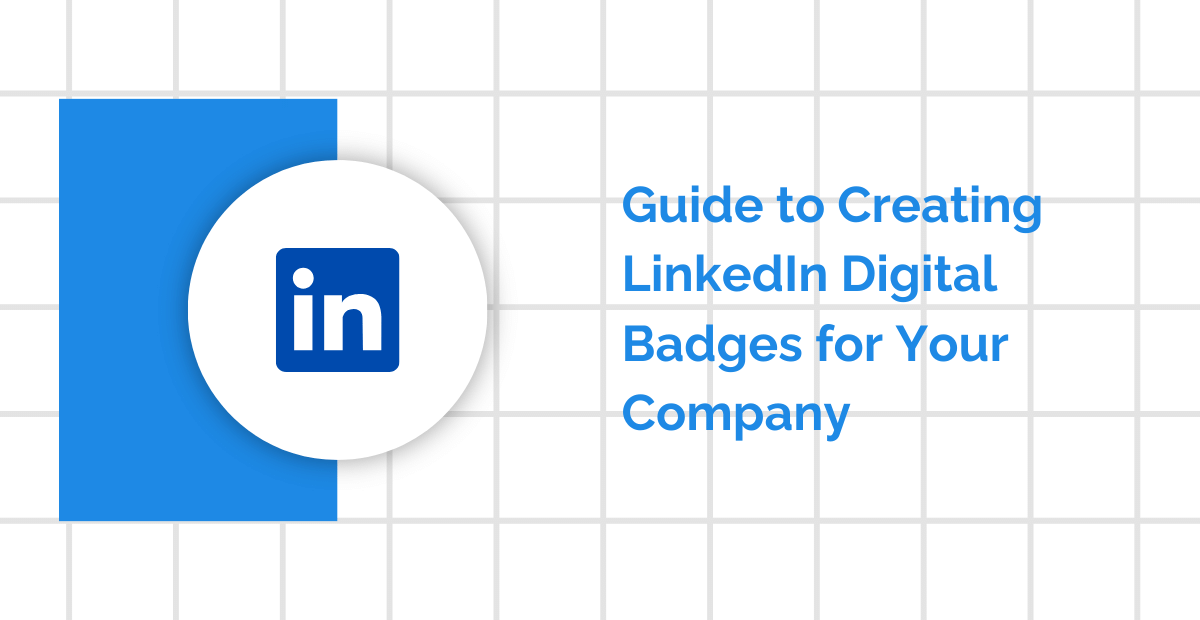Not long ago, a friend of mine—someone bright, driven, and actively job hunting—rolled their eyes at a digital badge on LinkedIn. “These are just virtual stickers, right? Like participation trophies but online?” And I got it. On the surface, a digital badge can look like a tiny graphic with no real substance. But that’s the thing—there’s a lot more behind that little icon than most people think.
Digital badges are gaining traction, especially in universities and workplaces, but they’re also misunderstood. Many students and staff members don’t know what they truly represent or how they work. That’s where this blog comes in. Think of it like a chat with a well-informed friend who’s excited to help you see things clearly—without the buzzwords, the tech lingo, or the hard sell.
In this post, we’re going to break down the most common myths about digital badges. We’ll explore what they are, what they aren’t, and why they actually matter—especially if you’re a student trying to stand out or an administrator looking for smarter ways to support learners.
Let’s clear up the confusion and dig into the truth behind those tiny credentials that are making big waves.
What Are Digital Badges, Really?
Let’s start with the basics: What even is a digital badge?
In plain English, a digital badge is a verifiable online representation of a skill, achievement, or credential. It could be for completing a course, mastering a particular skill, or participating in a specific project. But unlike a printed certificate, it’s clickable. And that click? It opens up to a whole new world of context.
Think of it like this: Imagine earning a scout badge—but instead of sewing it onto your sash, you get a link. Anyone can click on that badge to see:
-
Who issued it (like a university or company)
-
What you had to do to earn it (coursework, a project, a test, etc.)
-
When you earned it
-
Whether it’s still valid or has expired

That extra layer of information is called metadata. In tech-speak, that means ‘data about data.’ But in regular speech? It’s the proof behind the badge. Here’s a deeper look at what a digital open badge really is if you’re curious about how it all comes together.
Digital badges are being used everywhere—from short-term skill programs to co-curricular activities on campus. They’re popular in both academic and corporate settings because they fill a gap. Not every skill fits neatly into a diploma or transcript, and that’s where badges come in.
They’re portable, sharable (especially on LinkedIn), and give learners the power to tell their own story—one skill at a time.
Further Reading : What is the Difference Between Digital Badges and Traditional Certificates
Myth #1: “Digital Badges Are Just Icons or Stickers”
This is one of the biggest misconceptions out there—and honestly, it’s understandable. A digital badge does look like an icon. And we’re all used to seeing icons, emojis, or stickers that don’t mean much.
But here’s the truth: a digital badge is not just an image. It’s a container of verified information. It holds evidence—like a digital résumé fragment, only smarter.
Take a digital badge issued by a university for completing a leadership workshop. It’s not just saying, “I attended something.” It’s documenting that:
-
The workshop had specific learning outcomes
-
The participant completed assignments or reflections
-
There was an assessment or project at the end
And the best part? Anyone—an employer, another university, even a peer—can click and verify that information.
Let’s go back to our sticker analogy. Say you got a “Super Team Player!” sticker in elementary school. Cute, right? But did anyone outside your classroom know what you did to get it? Probably not. With a digital badge, you don’t just say you’re a team player—you show the world how you proved it.
That’s why platforms like CertifyMe make sure badges aren’t just pretty designs. They embed metadata that gives credibility. Each badge tells a story, and the story is what makes it trustworthy.
So next time someone says it’s just a virtual sticker, ask them to click on one. Chances are, they’ll see a lot more than they expected.
Myth #2: “They’re Not Valued by Employers”
It’s easy to think that hiring managers don’t care about digital badges—but that’s becoming less and less true every year.
Many top employers are not just accepting badges—they’re issuing them. IBM, Google, and Microsoft all have badge-based programs. These companies understand that not all skills are captured in degrees—and that badges can be a faster, clearer way to identify top talent.
Let’s say a student completes a Python course and earns a digital badge. When they apply for a data internship, the badge serves as proof that they didn’t just say they know Python—they actually did the work. Think about it this way: Would you rather see a bullet point on a resume that says “attended marketing seminar,” or click a badge that links to the syllabus, the completed project, and the instructor’s name? The second one provides confidence.
And employers don’t just look at what you studied—they want to know what you can do. That’s where microcredentials and badges shine. They highlight soft skills like collaboration, leadership, and initiative—things that might not show up on a transcript.
So, while it’s true that badges are still gaining awareness, they’re already being used in smart hiring practices. Some companies are even using LinkedIn badges to boost brand trust and employee recognition, making them valuable at both ends—employer and candidate.
Myth #3: “Digital Badges Are Only for Techies”
Nope. Not even close. If you think digital badges are just for coding bootcamps or computer science majors, it’s time to broaden that view.
Digital badges are being used for everything from:
-
Diversity and inclusion training
-
Peer mentoring programs
-
Nursing and healthcare simulations
-
Sustainability initiatives
-
Soft skill development like communication or leadership
On many campuses, students are already earning digital badges without realizing their value. For instance, universities might issue badges for orientation participation, mental health training, or volunteer work. These aren’t just feel-good experiences—they reflect real-world skills that employers value.
And for administrative staff? Badges are a way to track and recognize staff development, cross-training, or participation in conferences.
Digital badges aren’t about the field you’re in—they’re about the skills and growth you’re showing along the way. Whether you’re a first-year sociology major or a registrar’s assistant learning new software, a digital badge can document your journey.
So no, you don’t need to be a “tech person” to earn, issue, or benefit from badges. You just need a skill—or a story—to share.
Myth #4: “Anyone Can Fake or Buy a Badge”
Let’s talk about trust. One big worry people have about digital badges is: Can’t someone just buy one or fake it?
The answer? Not if it’s a legitimate badge.
Trusted badge issuers use secure platforms that build verification into the badge itself. This is where terms like “blockchain” get thrown around, but let’s simplify that. Think of verification like a sealed envelope with a return address. When someone opens it, they can instantly see:
-
Who issued it
-
What you did to earn it
-
Whether it’s authentic
You can’t Photoshop that. And you can’t buy it on a shady website without it being obvious.
In fact, digital badges are one of the strongest tools we have to fight credential fraud. Fake diplomas and forged resumes are a real issue. But with a digital badge, the credential lives on a verified platform. No guesswork.

For example, CertifyMe and other badge providers use encrypted systems that lock the badge’s data. You can’t edit or duplicate it without leaving a trace.
So, while fake paper certificates still circulate, digital badges are raising the bar for authenticity.
Myth #5: “Digital Badges Will Replace Degrees”
Here’s a myth we really need to clear up: Digital badges are not trying to replace degrees. They’re here to complement them.
A degree is still a powerful signal of commitment, learning, and discipline. But it’s also broad. It doesn’t always show the details—what specific projects you did, what tools you used, or what soft skills you developed.
That’s where badges come in. They fill in the gaps with detailed, skill-focused proof.
Imagine your degree is a full meal. A badge is like the seasoning—it brings out the flavor, the details that make your experience unique.
In today’s job market, employers aren’t just hiring based on diplomas. They want agile learners—people who can grow, adapt, and build new skills quickly. And that’s what badges show.
They allow lifelong learners to keep stacking up skills, even long after graduation. So if you’re a student or staff member adding new tools to your toolkit every semester or year, badges are a smart way to document that growth.
Why Digital Badges Matter—Especially in Universities
Now that we’ve cleared up the myths, let’s talk about the real value—especially in higher education.
For students, badges offer:
-
Recognition for co-curricular achievements
-
Verifiable proof of soft skills and technical training
-
Easy-to-share credentials for resumes and job platforms
Think about all the learning that happens outside the classroom—group projects, volunteer work, student government, peer tutoring. Most of that doesn’t appear on a transcript. But with badges, students can showcase their full college experience.
For university staff, badges can:
-
Help track non-credit programs and workshops
-
Encourage continuous professional development
-
Standardize recognition for internal training
Registrars and admin staff can use badge platforms to track learner progress, issue credentials, and improve data transparency. For example, a link building skills sub-section under an SEO minor degree program can be meaningfully recognized and tracked by issuing a digital badge for it. It’s more efficient—and meaningful—than issuing paper certificates that collect dust.
In both cases, badges help create a richer, more accurate picture of what someone knows and can do. If you’re wondering how badges and certificates work together to highlight skills, this guide breaks it down simply.
What to Look for in a Trusted Digital Badge
Not all badges are created equal. If you’re a student or staff member looking to earn—or issue—a badge, here’s what to look for:
-
A credible issuer (university, employer, or recognized platform)
-
Clear criteria for how it’s earned
-
Metadata that explains the skills or outcomes
-
Verifiability—anyone should be able to check its authenticity
Badges that meet these standards are trustworthy, valuable, and portable. They’re not fluff—they’re fact.

For a quick reference, check out this blog on Best Certificate Wording Examples to see how language and structure can affect credibility.
“Still Skeptical? That’s Okay”
It’s normal to question new trends—especially in education. But digital badges aren’t just a passing fad. They’re already changing how students, staff, and employers recognize learning.
If you’re still unsure, here’s a challenge: Click on a badge next time you see one. Explore what it says. Look at the metadata. You might just be surprised at how much information that little icon holds.
At the end of the day, badges aren’t here to brag. They’re here to tell your story—one verified skill at a time.
So whether you’re building your résumé, managing a training program, or just curious about what’s next in education, digital badges are worth your attention. Not because they’re trendy, but because they work.
And that’s no myth.
Conclusion
It’s totally fair to be cautious about anything new—especially in education and hiring. But now that we’ve peeled back the layers, you can see that digital badges are more than just tiny graphics online. They tell real stories about skills, effort, and progress. And sometimes, it’s these small details that help students or staff stand out in a big way.
Still curious? Good. Next time you come across a badge—whether it’s on someone’s LinkedIn or your campus intranet—click it. Read the criteria, see what it took to earn it, and imagine how it could apply to you or your team. Once you’ve seen what’s inside, you might not look at them the same way again.
If you’re ready to explore how digital badges can help your students or staff track growth, recognize learning, or build stronger resumes, CertifyMe makes it easy to get started.
Their platform lets you issue, manage, and verify badges—all in one place—with transparency and trust baked in. Whether you’re a student looking to show off real skills or a registrar aiming to streamline achievements, CertifyMe is worth a closer look.
Book a quick demo today and see it in action for yourself.

 Author :
Author : 




